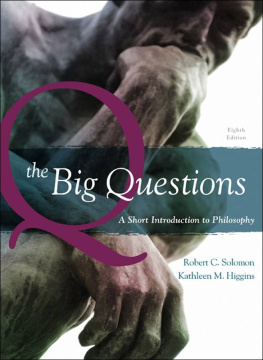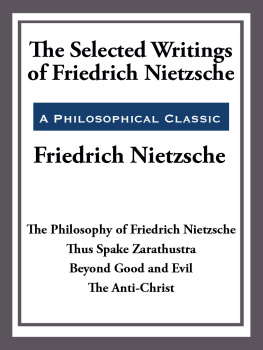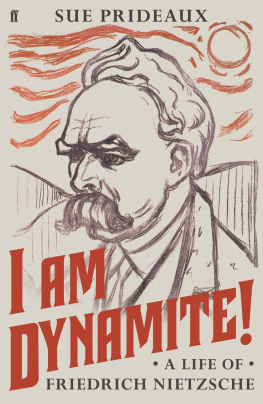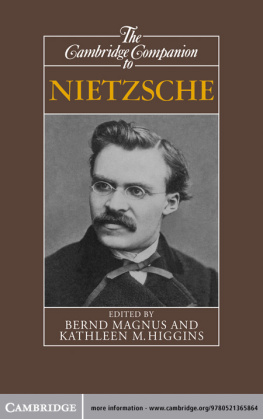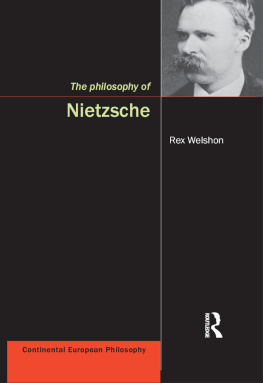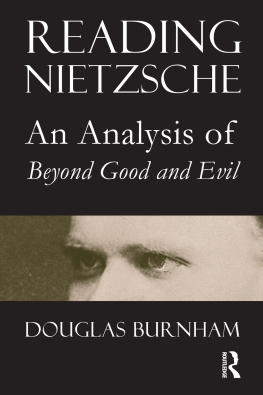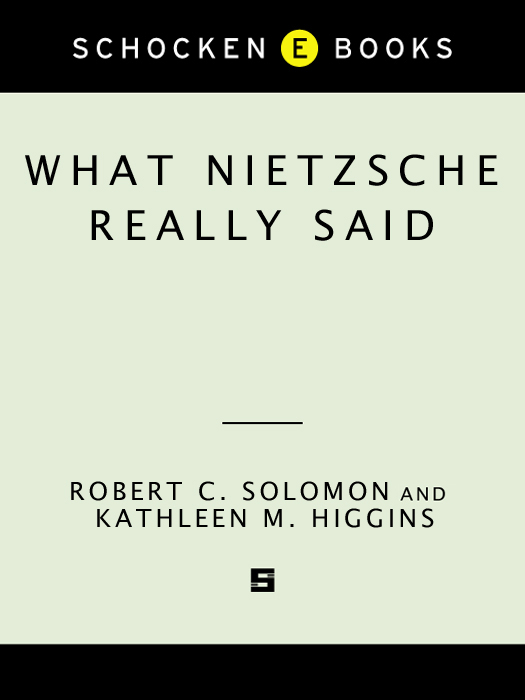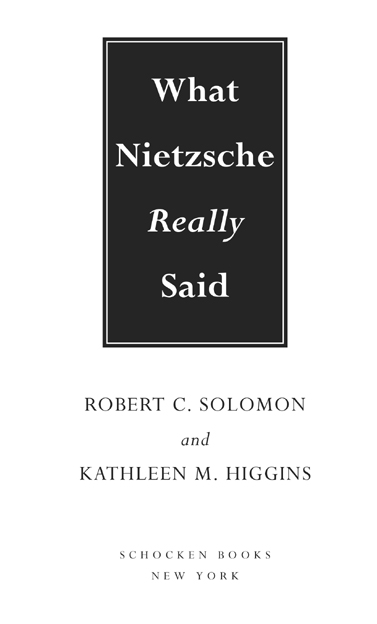OTHER TITLES IN SCHOCKENS
What They Really Said SERIES
What Freud Really Said by David Stafford Clark
What Jung Really Said by E.A. Bennet
What Darwin Really Said by Benjamin Farrington
Copyright 2000 by Robert C. Solomon and Kathleen M. Higgins
All rights reserved under International and Pan-American Copyright Conventions.
Published in the United States by Schocken Books, a division of Random House, Inc., New York, and simultaneously in Canada by Random House of Canada Limited, Toronto. Distributed by Pantheon Books, a division of Random House, Inc., New York.
Originally published in hardcover by Schocken Books, a division of Random House, Inc., New York, in 2000.
Schocken and colophon are registered trademarks of Random House, Inc.
Grateful acknowledgment is made to the following for permission to reprint previously published material: Viking Penguin: Twilight of the Idols, The Antichrist and Thus Spoke Zarathustra by Friedrich Nietzsche, and Nietzsche Contra Wagner by Friedrich Nietzsche, edited by Walter Kaufmann, from THE PORTABLE NIETZSCHE , edited and translated by Walter Kaufmann. Translation copyright 1954 by The Viking Press, renewed 1982 by Viking Penguin Inc. Reprinted by permission of Viking Penguin, a division of Penguin Putnam Inc. Random House, Inc.: Excerpts from THE GAY SCIENCE by Friedrich Nietzsche, translated by Walter Kaufmann. Copyright 1974 by Random House, Inc.; excerpts from ON THE GENEALOGY OF MORALS by Friedrich Nietzsche, translated by Walter Kaufmann. Copyright 1967 by Random House, Inc. Reprinted by permission of Random House, Inc.
Library of Congress Cataloging-in-Publication Data
Solomon, Robert C.
What Nietzsche really said / Robert C. Solomon and Kathleen M. Higgins.
p. cm.
Includes bibliographical references.
eISBN: 978-0-307-82837-8
1. Nietzsche, Friedrich Wilhelm, 18441900. I. Higgins, Kathleen Marie. II. Title.
B3317.S6155 2000
193dc21 99-33796
www.schocken.com
v3.1
for Frithjof Bergmann
and Karsten Harries
Contents
Acknowledgments
We would especially like to thank Cecilia Cancellaro for encouraging us to take on this project and for her support throughout. We want to thank Jennifer Turvey for seeing the book through in its final stages and our agent Melanie Jackson for her continuing advice. We would also like to thank our various editors and publishers who have allowed us to pillage our previous and present writings on Nietzsche, in particular, Richard Schacht and Terry Moore at Cambridge University Press (Richard Schacht, ed., Nietzsches Postmoralism, New York: Cambridge University Press, 1999), Richard Schacht again, Nietzsche, Genealogy, Morality: Essays on Nietzsches On the Genealogy of Morals (Los Angeles: University of California Press, 1994), Bernd Magnus and Cambridge University Press again (The Cambridge Companion to Nietzsche, ed. Bernd Magnus and Kathleen Higgins), and Tom Rollins at The Teaching Company (The Will to Power: The Philosophy of Friedrich Nietzsche, 24 video/audio lectures, 1999). We would like to thank Random House and Viking for their kind permission to quote from Walter Kaufmanns translations of Nietzsches central texts.
Nietzsches Works
| The Birth of Tragedy, Out of the Spirit of Music | 1872 |
| Untimely Meditations |
| David Strauss, the Confessor and the Writer | 1873 |
| On the Uses and Disadvantages of History for Life | 1874 |
| Schopenhauer as Educator | 1874 |
| Richard Wagner in Bayreuth | 1876 |
| Human, All Too Human, A Book for Free Spirits | 1878 |
| Human, All Too Human II | 1879 |
| Daybreak, Thoughts on the Prejudices of Morality | 1881 |
| The Gay Science | 1882 |
| Thus Spoke Zarathustra, A Book for All and None | 188385 |
| Beyond Good and Evil, Prelude to a Philosophy of the Future | 1886 |
| On the Genealogy of Morals, A Polemic | 1887 |
| The Case of Wagner: A Musicians Problem | 1888 |
| Twilight of the Idols, or How One Philosophizes with a Hammer | 1889 |
| The Antichrist | 1895 |
| Nietzsche contra Wagner: Out of the Files of a Psychologist | 1895 |
| Ecce Homo, How One Becomes What One Is | 1908 |
| The Will to Power |
In second edition (1886) title changed to The Birth of Tragedy, or Hellenism and Pessimism.
Date of publication; written in 1888.
Edited by others; published posthumously.
Introduction:
How to Philosophize with a Hammer
Regarding the sounding out of idols, this time they are not just idols of the age, but eternal idols, which are here touched with a hammer as with a tuning fork; there are altogether no older, no more convinced, no more puffed-up idolsand none more hollow. That does not prevent them from being those in which people have the most faith
from Twilight of the Idols
HERE AT THE END of the twentieth century, Friedrich Nietzsche has become one of the most talked about philosophers in history. Unfortunately, he has not also become one of the best understood. Myths and rumors continue to swirl around his legacy, some of them concerning his sex life, his politics, his mental health, many of them supposedly cutting to the heart of his philosophythe will to power, his attack on religion and morality, and the infamous bermensch (super-man). What Nietzsche really said gets lost in a maze of falsehoods, misinterpretations, and exaggerations. But he is such an exciting and insightful thinker, not to mention a mesmerizing writer, that it is well worth our whileand a treatto really understand him.
Getting down to what Nietzsche really said, however, is no simple matter. He was not one of those philosophers who set out with a carefully plotted plan and pursued it faithfully to its completion. He was not a systematic philosopher: he railed against the attempt to make philosophy into a system, calling it a lack of integrity. We cannot squeeze all of Nietzsches varied observations and insights into a single coherent mold without losing not just the charm but the essence of what he was trying to do. Nietzsche wrote in aphorisms, short paragraphs, and cryptic allegories, carefully arranged but nevertheless disjointed and purposively disorienting. He wanted to shock us, surprise us, make us see matters from different angles, different perspectives, in different ways. Much of his writing consists of quick guerrilla-style attacks on a broad variety of established positionsmoral, metaphysical, social, and religiousand some of the leading figures of both his past and present. Nietzsche aims in different directions, now attacking this position, now attacking its opposite. Such strategies may look like contradiction, but they are not. These multiple campaigns represent the many different skirmishes of an untimely man, as he describes his onslaughts in


